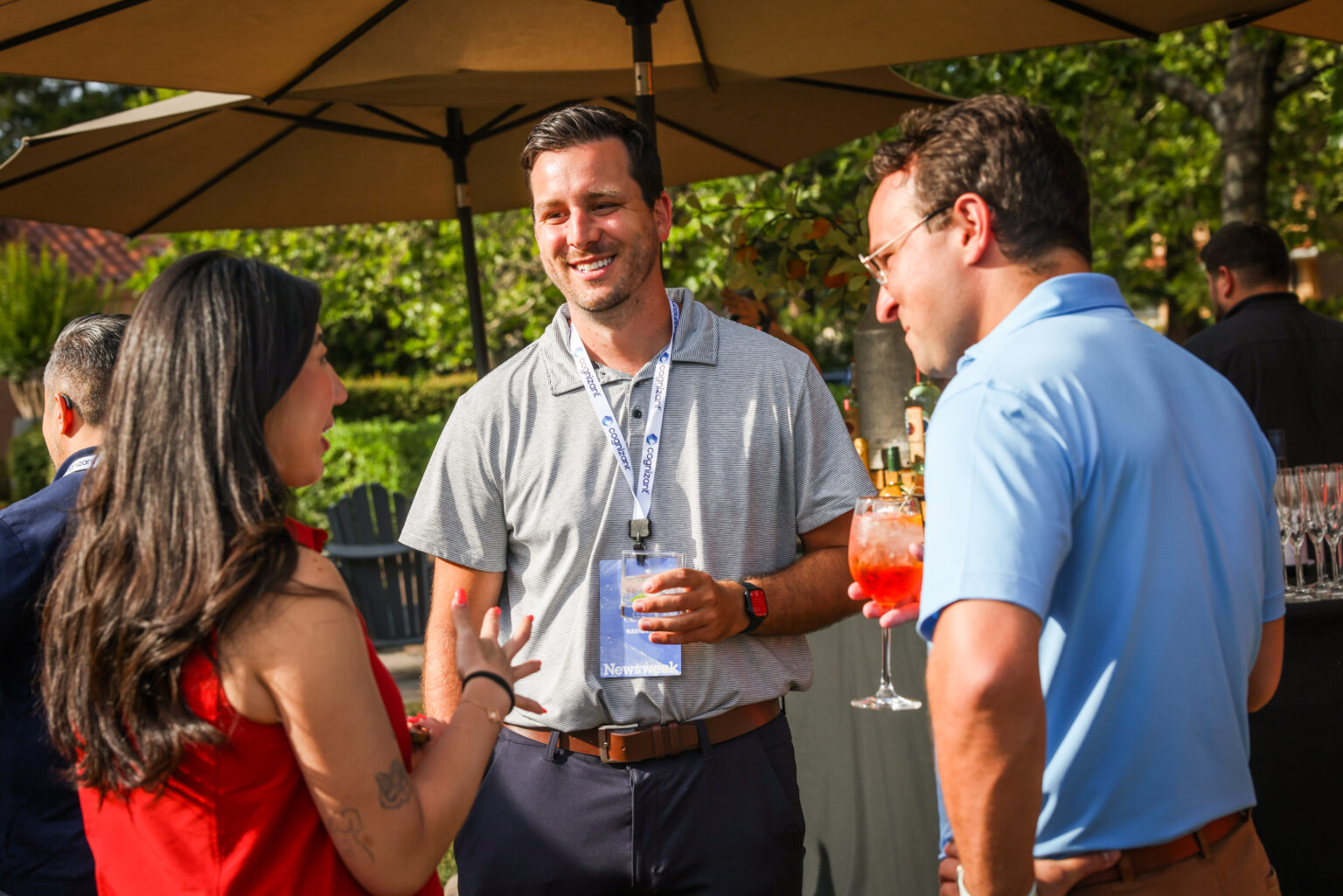Under a big white tent on the pavilion of the Fairmont Sonoma Mission Inn & Spa, dozens of AI leaders gathered on Monday to attend the first day of Newsweek‘s AI Impact Summit.
“The lineup is fantastic,” Christian Cavello, a senior manager of customer experience and strategy at consulting firm Navigate, told Newsweek during the networking reception.
Suma Nallapati, the chief information officer for the city of Denver, agreed, emphatically telling Newsweek that she found industries and sectors alike “well-represented” on the stage. Nallapati herself will take the stage tomorrow for day two of the summit.
Over the next two days, some of the most important industry voices are joining Newsweek to discuss how organizations can leverage new capabilities most effectively in the age of AI.
Monday was jam-packed with insightful conversations about whether organizations should build AI in-house or outsource it, how to re-skill employees in the age of AI and how to foster trust through responsible AI.
The speaker list for the first day of the summit included Babak Hodjat, Cognizant’s chief technology officer; Francis deSouza, Google Cloud’s chief operating officer; and Sriram Thiagarajan, Ancestry’s chief technology officer, among others.
Ashley Britt, the vice president of finance at Octopus Energy, said she was most interested in deSouza’s panel, “The New Era of AI: From Experimentation to Transformation,” which explored how companies in every industry can successfully implement AI.
Britt told Newsweek she liked “the way he framed that it’s bigger than just the small, practical implications that we had originally took a lot of notes on, and going into how it’s basically going to touch everybody.”
“I come from a finance background, so technology is not usually deployed immediately,” Britt said. At Octopus Energy, Britt uses machine learning to turn large swaths of data into a simplified model forecast that’s critical to procurement decisions.
During the end-of-day reception, Britt sat with Sunya Norman, the senior vice president of impact at Salesforce, under the big umbrellas on the breezeway lawn. Norman, who accepted Newsweek‘s AI Impact Award on behalf of Salesforce this year, said it was extremely valuable for her to hear directly from chief information officers at other companies to understand how Salesforce should market itself with AI.
“It’s helpful to see where there was overlap in messaging and worldview and to hear how different people are thinking about it,” Norman said. “The speakers were super articulate.”
This year, Salesforce was awarded Best Outcomes, General Learning for the education-focused accelerator that it launched in 2023.
Norman said she found it poignant to hear that Thiagarajan himself had not been able to look into his own family history as the CTO of the world’s largest for-profit genealogy company. During his panel session, Thiagarajan explained that he had not been able to discover his own lineage because of lags in data collection among Asian countries.
“Hearing the speaker from Ancestry being like, ‘There’s not really any digital records,’ is a good reminder that not every country is the same,” Norman said. “There’s a lot of equity issues and there’s a lot of people being left behind.”
After seven sessions in the pavilion, plus a networking break that included jumbo cookies and an AI piano whose keys played on its own, attendees chose their own adventure, picking between two roundtables: “The AI Paradox: Tech Moves Fast, But Organizations Don’t” and “The Future of Generative AI: What’s Next Beyond Chatbots?”
Navigate’s Cavello and Alex Bunda led the former in the Kenwood Ballroom.
Basking under the California sun, Bunda said between sips of his Aperol spritz that he heard great, “cathartic” conversations around the “collective experience” that many leaders are facing in the age of AI.
“It’s not a tech problem,” Bunda, a senior manager at Navigate, told Newsweek. “We see the tech is continuing really fast—an exponential pace of change. It’s a people and adoption problem.”
“At my table was this doctor from a very small practice, a health care executive and somebody from the electrical trade distribution industry,” Bunda recalled. “You would not suspect you’d be able to have a conversation across those industries but they all share the same challenge, whether you’re dealing with a patient or with the supply chain.”
In the room next door, where attendees discussed the future of generative AI, there were debates about whether a no-guardrails approach to AI in the workplace could promote curiosity and innovation. One table—which consisted of a product design expert, a NASA representative and a tech executive—felt the answer was a “pretty hard no.”
“With every interaction, there needs to be some sort of interrogation and understanding, and that just doesn’t really exist,” one of the attendees said. “That’s always been an [machine learning] problem. You build a black box, you shake the box and stuff comes out. It’s awesome when it works, but then you’re like, ‘why did it do this thing?'”
At another table, the answer was “a combination of no and yes.”
“Using responsible AI, making sure that it’s within the guardrails of the enterprise standards and architecture standards and things like that, but also letting people try with all these agents, and have them experiment and see where they go,” another attendee said.
Newsweek‘s AI Impact Summit will continue on Tuesday as additional speakers take the stage to discuss the role of AI in health care, consumer behaviors, filmmaking, urban planning, weather forecasts and more. Check out the full lineup here.
Read the full article here


